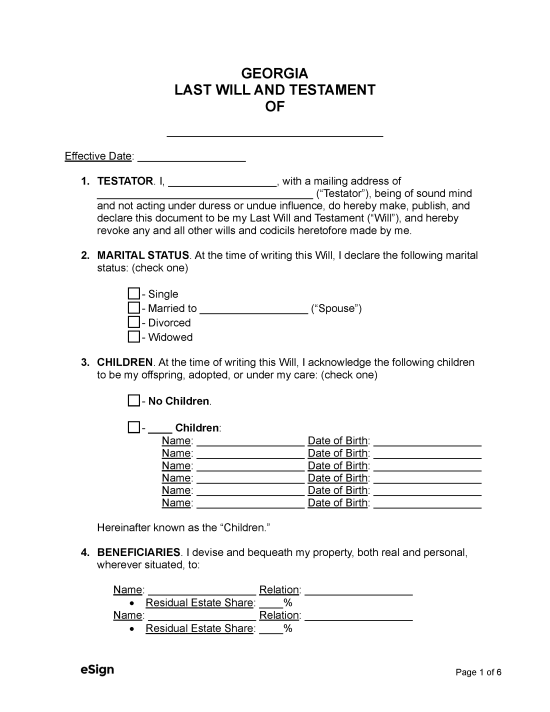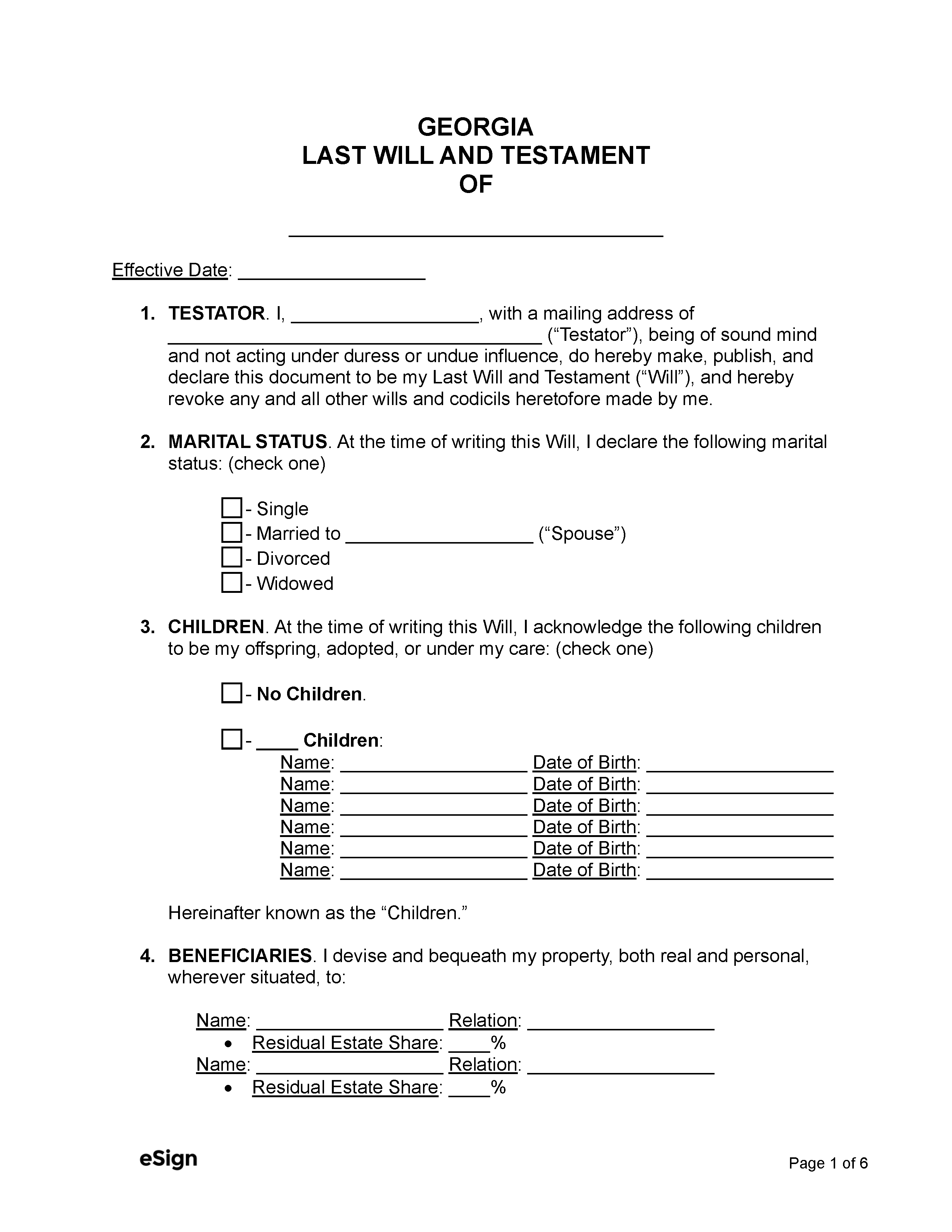State Laws
Any individual who is 14 or older can make a will if they are of sound mind and do so of their own volition.[1]
Holographic Wills – Wills made in the testator’s handwriting must meet the same state requirements as other wills to be valid.[2]
Revocation – The testator can revoke their will by written revocation, the execution of a subsequent will, or by destroying the document.[3]
Signing Requirements – A will must be signed by the testator and two attesting witnesses.
Probate Process in Georgia (9 steps)
When someone who has made a will dies in Georgia, their estate usually has to pass through solemn form probate before the beneficiaries can receive their inheritance. Unlike the simpler, common form probate, the beneficiaries must be notified that they can object to the will, but once the objection period passes, the will can no longer be contested.[4]
- Petition to Probate Will in Solemn Form
- Notice to Decedent’s Heirs
- Appointment of Executor
- Petition for Year’s Support (If Applicable)
- Notice to Debtors and Creditors
- Estate Inventory
- Paying Debts
- Distribution of the Estate
- Petition for Discharge
1. Petition to Probate Will in Solemn Form
If there is no will, and all creditors and beneficiaries agree, the estate may be able to bypass probate by using the Petition for Order Declaring No Administration Necessary.
To open the probate of a decedent’s will, a Petition to Probate Will in Solemn Form must be completed and filed with the probate court for the county where the decedent lived, along with the original copy of the will. The petition requires notarization.
2. Notice to Decedent’s Heirs
Once a Petition to Probate Will in Solemn Form has been filed with the probate court, each legal heir of the decedent must be notified.[5] The court will arrange for notice to be served on any Georgia resident heirs by their county sheriff’s office or, at the petitioner’s request, by certified mail.[6] Any heirs from out of state will receive notice by certified mail.[7]
Alternatively, the petitioner can deliver a copy of the will, the completed petition, and an Acknowledgment of Service form to the decedent’s heirs.[8] Any heirs that complete, notarize, and file the Acknowledgment of Service will not need to be served by the court. This reduces administration costs and saves time.
3. Appointment of Executor
After the heirs have been notified and a petition has been submitted to the probate court, the named executor will need to go to the courthouse to sign an oath administered by a clerk or judge. The court will then review the petition and the decedent’s will. If there are no issues with the will or petition, the judge will issue an Order Admitting Will to Probate in Solemn Form that officially appoints the executor as the estate’s representative and opens probate.
If any heirs object or the court thinks it necessary, a hearing may be held before the will is approved and Letters are granted.
Letters Testamentary
With the will approved and the oath taken, the court will issue Letters Testamentary that authorize them to administer the estate. Within 30 days of receiving Letters Testamentary, the executor must notify all beneficiaries of their appointment unless the requirement was waived.[9]
Bond
The executor must post a bond as security for the estate unless the will or the heirs waive the requirement.[10]
4. Petition for Year’s Support (If Applicable)
If the decedent is survived by their spouse or minor children, the spouse or children’s guardian can file a Petition for Year’s Support with the court requesting one year’s financial support from the estate.[11]
The petition must be filed within 24 months from the decedent’s death date. Notice of the petition must be served on all beneficiaries, legal heirs, named executors, and known creditors and published in a local newspaper for four weeks. If the recipients sign an Acknowledgment of Service, formal service isn’t required.
5. Notice to Debtors and Creditors
Within 60 days of their appointment, the executor must arrange for a Notice to Debtors and Creditors to be published in a locally circulated newspaper. Publication will run for four consecutive weeks, and the notice alerts any of the decedent’s creditors that they have three months from the last date of publication to make claims against the estate.[12]
6. Estate Inventory
Unless the will or the beneficiaries waive the requirement, the executor must complete and file a full inventory of the decedent’s estate with the probate court within six months of the probate filing.[13] If an inventory is made, the executory should also deliver copies to the beneficiaries.
7. Paying Debts
The executor has six months from their appointment date to pay the decedent’s debts before claimants can take action to recover their money.[15] All valid claims must be completed before the estate can be distributed to the beneficiaries.
The priority for payment of claims:
- Year’s support for spouse and minor children
- Funeral expenses
- Administration costs
- Final costs (medical and hospital bills)
- Taxes and other debts to the state or country
- Secured interests and liens
- All other claims[14]
Filing Taxes
The executor must file the decedent’s final state and federal income tax returns with the Georgia Department of Revenue and IRS. Any income the estate received after the decedent’s death will also need to be declared.
9. Petition for Discharge
After all of the above steps have been completed, the executor will need to complete and file the Petition for Discharge of Personal Representative with the probate court. The petition will need to be acknowledged by or served on the decedent’s heirs in the same manner as the Petition to Probate Will in Solemn Form.
Final Order
If everything is in order, the court will grant the executor’s discharge, close the estate, and release them from any liability associated with their administration by executing the Final Order.[16]

